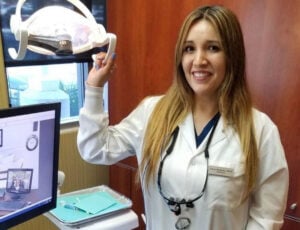Sponsored Content
New Year’s is always a time for optimism as we look forward to healthy, happy and prosperous. times ahead. Meanwhile, we are in the aftermath of the holidays which, while enjoyable, can also be stressful. Relationships, finances, and shorter days affecting our internal ‘clock’ can all cause stress.
Dr. Hans Selye, the scientist who pioneered the study of stress, defined it as a “nonspecific response of the body to any demand.“ Dr. Selye emphasized that there are ‘good’ and ‘bad’ stressors. A ‘good’ stressor challenges us, pushing us past our comfort zone in a positive way to explore new areas of endeavor. In this article, we will look at ‘bad’ stressors that affect health, including dental health, and overall well-being.
1) Top of Mind as a stressor is unhealthy eating. Overindulging in sugary holiday treats puts an acidic load on our bodies and our mouth. From the dental viewpoint, this can demineralize teeth and feed the unfriendly microbes that cause tooth decay and infection. In addition, both sugar and overeating put burdens on the digestive system.
2) Worry is a different kind of stress that can also turn the mouth acidic and keep us awake at night when our bodies should be resting and repairing.
3) Stress and worry can also cause us to clench and grind our teeth, a condition known as bruxism. This sets up an unhealthy muscle patterning in the jaw that can contribute to TMD (temporomandibular disorder), pain, loose teeth, and gum recession if not addressed,
4) Stress can keep our salivary glands from functioning properly. This is important because of the role saliva plays in remineralizing teeth and in preparing food for digestion. Saliva is released by the parotid gland, which also releases enzymes to start the digestive process and activate our immune system. Our digestive system is very important to the immune system because there are so many immune cells in the gut.
5) Stress from toxic metals like nickel in some old crowns and braces and mercury found in amalgam fillings can leak into our bodies. In addition, mercury can be swallowed during the removal of old dental work, adding more stress to the body. So it’s imperative to protect the patient from exposure to metals during dental work.
6) EMFs (electromagnetic fields) from cell phones cause electrical charges in metal fillings and crowns and inflammation in the tissues of the head and neck. These microcharges can actually be measured in the mouth and are called galvanic charges. The FDA recently wrote a large article highlighting galvanic/electrical charges in the mouth and their effects. Their paper also discusses corrosion in titanium (metal-based) implants. Here are some recommendations for alleviating stress and its effects on the mouth, digestive and immune systems.
1) Hydrate. Drink lots of water. Sometimes we think that we are hungry when we are really thirsty.
2) Use essential oils like lavender and chamomile in a diffuser which can calm and rebalance your nervous system and lessen the need for that extra helping or late night treat. Lavender oil applied to the hollow in the back of the neck can be soothing and relaxing. Herbs like Gymnema can help with sugar cravings.
3) Read labels! So many processed and prepared foods contain sugar. So can otherwise healthy foods like gluten-free bread and granolas. When creating homemade desserts use Xylitol for your sweetener as it is actually good for your teeth. Stevia, an herbal sugar substitute can be used, although it can have a strong flavor or aftertaste.
4) Chamomile tea before bed is calming and can also be taken at any time as a homeopathic remedy. It is also available as a capsule, tincture or in pill form. Other herbs that promote restful sleep are kava kava, valerian, skullcap and passionflower. Combinations of the above herbs are also available. Another bedtime homeopathic remedy is Hyland’s Calms Forte. Rescue Remedy, a classic combination of flower essences, is another well-known support for stressful times. Post-Trauma Care can be a powerful mood adaptor as well as other formulas in the Flourish line from Flower Essence Services.
5) It is possible to retrain yourself to relax the jaw at night. However, sometimes we need additional help and for that, your dentist is the best one to turn to. Over-the-counter night guards are available at your local pharmacy, however, these are made from a soft material that sometimes makes matters worse. You can check with your dentist as to the material the nightguard would be made of, as acrylic is often used and is not biofriendly. Flexite and Astron are two acceptable alternative materials.
6) Salivary glands are located in the mouth, cheeks, lips and throat. The largest are the parotid glands, which are situated in front of the ears. The parotid glands can become blocked due to dehydration, smoking, certain medications and gum disease. Be mindful of how much water you drink and learn if any prescribed medications you take can cause dehydration. And if you have gum disease, consult a specialist, as this is a condition that can profoundly impact your health.
7) Get tested for metal levels in your body, especially if you still have metal restorations in your teeth other than gold. In addition, if you have metal restorations removed and replaced, make sure it is done safely. Don’t hold your cell phone up to your head, use the speaker or get earbuds.
Dr. Carey O’Rielly, DDS is a holistic dentist practicing at Integrative Dentistry in Encinitas together with Dr. Bo Ah Kim and Dr. Hyung Jin Bae. To learn more visit him at at myholisticdentist.com or contact us at 760-632-1304.
Dr. Carey O’Rielly is a holistic dentist operating in San Diego. He believes passionately that creating health and beauty around us is an integral part of life and you will feel these qualities in our office.




